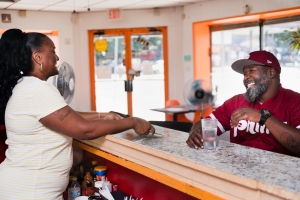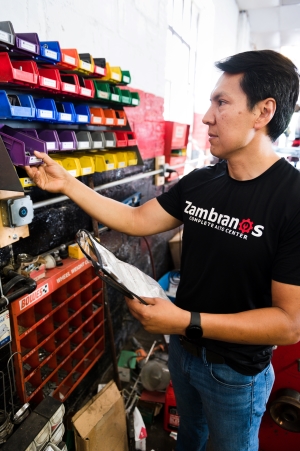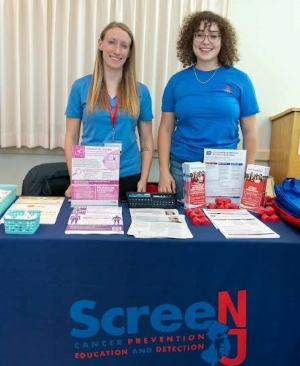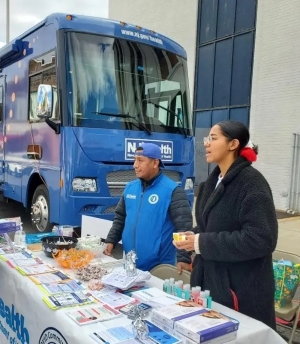Resilient New Jersey
Rutgers Global Health Institute’s Resilient New Jersey program supports the development of healthy and resilient communities in our state – communities that not only can withstand a crisis, such as the COVID-19 pandemic, but also can thrive, even in the face of obstacles. Focusing on local needs, we partner with community stakeholders, including small businesses and nonprofit organizations, to facilitate and initiate targeted programming related to health care access, health education, and business and community resources.
We are collaborating with low-income and minority communities in New Jersey. Nearly 25 percent of our state’s residents are foreign born, and 45 percent identify as people of color. Economic disparities in New Jersey also are pronounced. There are more millionaires per capita here than any other state in the country, but there is also significant urban poverty. More than 400,000 households receive NJ SNAP food assistance benefits.
These vulnerable communities often are disproportionately impacted by inequalities – systemic and structural racism, marginalization, socioeconomic disadvantages – that affect community members’ overall health, well-being, and livelihoods. Through Resilient New Jersey, our aim is to do more than simply acknowledge these factors. Our approach includes being intentionally anti-racist and taking deliberate actions to identify and dismantle the barriers that inhibit communities’ capacity to thrive.
Challenges and Opportunities in Our Communities
In our state’s low-income and minority communities, some challenges are especially pronounced. For example, in Rutgers’ home cities of New Brunswick, Newark, and Camden, as well as in Trenton, New Jersey’s capital, roughly a third of residents live below the poverty line. Because of this and other socioeconomic and environmental factors, these cities and other vulnerable communities throughout New Jersey – our neighbors – are continuously impacted by systemic health inequities:
- Their access to quality health care is limited for reasons related to employment, transportation, and affordability.
- Hunger and undernutrition are serious problems that inhibit active, healthy lifestyles.
- Safe and clean environments are jeopardized by pollution, crime, and inadequate resources to address public property maintenance and sanitation needs associated with urbanization.
The strength and capabilities of New Jersey’s marginalized communities, however, are incredible assets. The community members who care about one another and take pride in where they live and work are stewards of community health and resilience. They are the “movers and shakers” who forge relationships and make things happen to help their communities thrive.
Supporting Local Small Businesses and Community Health
Many of these community stakeholders, we’ve learned, are owners and employees of local small businesses and nonprofit organizations. They have both personal and professional interests in the overall status of their communities, and their businesses also serve vital roles, such as:
- Creating jobs – which impacts health care, food security, and housing
- Contributing to active and maintained neighborhood spaces
- Providing access to goods and services, including locally and culturally relevant needs
- Influencing community spirit and vitality
- Fostering social and professional networks that can be called upon in times of celebration as well as crisis
We recognize the influential role that local small businesses and nonprofit organizations play in their communities. More than that, though, we understand that helping these local small businesses is a way to address the social, environmental, and structural factors that affect communities and community members’ overall health and well-being. Rutgers Global Health Institute offers the Resilient New Jersey program to provide support to these businesses – and in partnership with these businesses – all with the goal of developing healthy, strong, and resilient communities.


Program Details
Our Resilient New Jersey program is built around having a physical presence in the community and the support of our community partners, who are the eyes and ears for their neighborhoods. Our community partners include locally active social service agencies, faith-based organizations, neighborhood associations, community development organizations, and various service providers; local, county, and state health departments and other offices; and, of course, the small businesses and nonprofit organizations that call these communities home.
Together, we identify and discuss local needs, opportunities, and challenges related to health care access, health education, and business and community resources. Then, we collaborate to determine ways to address them in that specific community or neighborhood. Our approach recognizes that each community is different, and we rely on the knowledge, experience, and social capital of our community partners to help us facilitate and initiate targeted programming.
Resilient New Jersey initiatives:
- Community health fairs and health-related events that offer free health screenings, vaccinations, exercise classes, nutritious food, and connections to many resources related to health and wellness
- Health education resources, such as flyers and pamphlets, produced in multiple languages about topics of importance in the community (e.g., FAQs about vaccination, chronic disease management, and emerging public health issues)
- Customized training, resources, and support for small businesses and their employees (e.g., presentations about supply chain resilience, digital communications, and financial goal setting)
- A referral network of trusted organizations or providers that can offer support, resources, and services for needs related to:
- business planning and strategy
- financial management advice
- food assistance
- health resources: education about chronic and infectious diseases, medical and mental health services, preventive health screenings, public health recommendations, vaccination and testing services
- housing support
- legal and grant application guidance
- Minority and/or Women Business Enterprise (M/WBE) state certification assistance
- spiritual and faith-based services
- tax support services
- Local organizing led by multilingual community outreach coordinators


Local pathways to global health
With our Resilient New Jersey program, Rutgers Global Health Institute is taking a broad approach to health equity by addressing the needs of local small businesses and nonprofit organizations and collaborating with them to advance their communities. For there to be global health, we must address local health.
Get Involved
Want more info? For general inquiries about the program and partnership opportunities, contact communications@globalhealth.rutgers.edu.
Make a donation: Help us increase our impact and expand our reach in vulnerable communities throughout New Jersey. To support Resilient New Jersey and related efforts, you can make a gift to our Health Equity in New Jersey Fund or contact Hailey Lemasters, assistant director of development, for more information.https://give.rutgers.edu/globalhealth
Connect with Rutgers Global Health Institute: Subscribe to our monthly newsletter and follow us on Twitter and Facebook.
